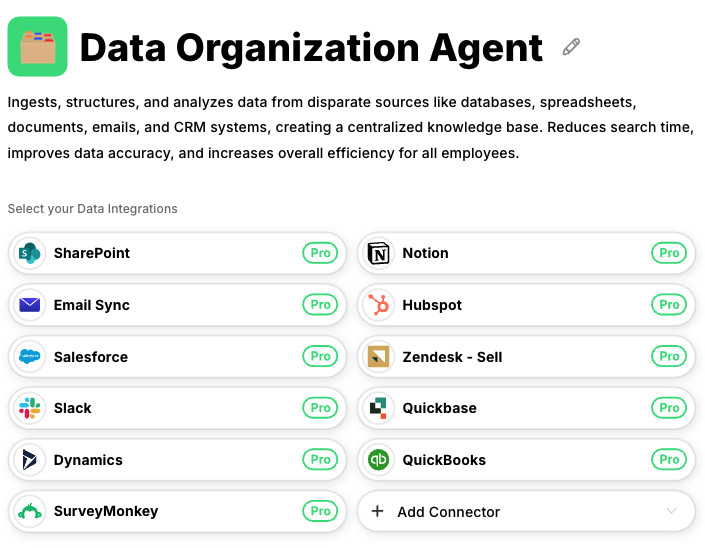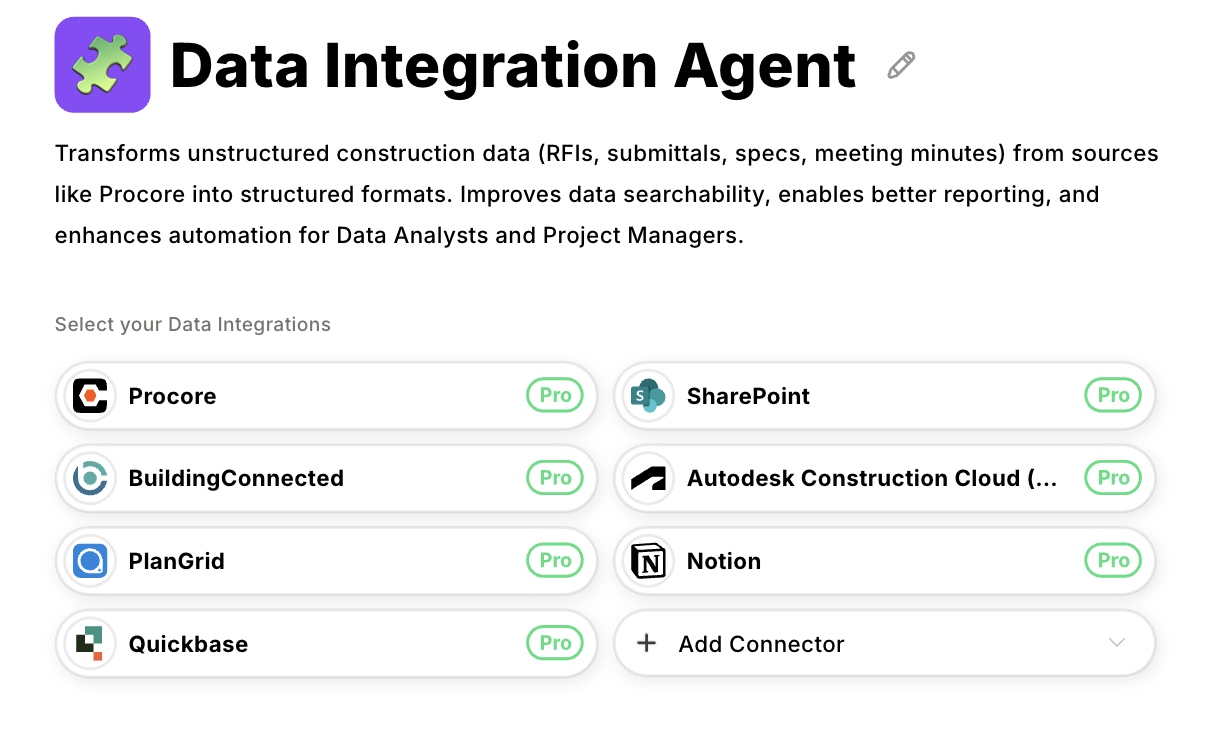Agentic AI refers to autonomous systems that receive high-level objectives along with access to your organizational data, documented procedures, and connected enterprise systems. These agents then reason through the available information and execute across your existing tools to accomplish those objectives.
Unlike traditional AI that answers questions when prompted, or automation that follows rigid rules until something breaks, AI agents continuously operate toward defined goals, making contextual decisions, coordinating across systems, and escalating only the exceptions that require human judgment.
Here's what this means in practice. Think about your best project manager and how she handles complex coordination across trades, specs, and schedules. She catches conflicts before they become change orders, tracks approvals without dropping the ball, and knows which subcontractors need extra oversight.
But when she's managing three jobs at once, routine coordination tasks compete with the strategic decisions only she can make. AI agents handle the tracking, routing, and deadline monitoring so her expertise stays focused on complex problem-solving, owner relationships, and the exceptions that require human judgment.
How AI Agents Work
Give an AI agent the goal "ensure we never run out of critical inventory," and it will autonomously monitor stock levels, analyze demand patterns, coordinate with vendors, initiate purchase orders, and escalate only the exceptions that require human judgment. It doesn't wait for the next instruction. It continuously operates toward the defined objective.
According to McKinsey's analysis, these systems are "capable of perceiving context, reasoning through complex and multistep challenges, and acting independently across digital systems."
How AI Agents Differ from Traditional Automation
The distinction matters because it determines what problems you can actually solve:
The practical difference is straightforward. RPA handles tasks like "move this data from system A to system B on a schedule." Traditional AI answers questions like "what's the risk level of this application?" AI agents take ownership of goals like "ensure all high-risk applications receive appropriate review within 48 hours" and autonomously figure out what that requires across your CRM, underwriting platform, and document management system.
Seven Characteristics That Define AI Agents
- Autonomous Goal-Oriented Behavior When a project engineer sets the objective "ensure no submittal delays the critical path," the AI agent independently prioritizes reviews, identifies bottlenecks, and escalates only the exceptions that threaten schedule. It does this without requiring step-by-step direction.
- Multi-Step Planning and Decomposition A single intake trigger (e.g., a new insurance claim notification) kicks off an agent that gathers policy details, analyzes coverage, calculates reserves, and prepares assignments. No human needs to orchestrate each handoff.
- Dynamic Contextual Adaptation When two customers both mention "refund," the agent recognizes that the VIP with an urgent shipping issue needs different handling than a routine inquiry. It adjusts priority, tone, and resolution path based on customer history and business impact.
- Tool and System Orchestration An underwriter asks "what's our exposure on this account?" The agent queries the CRM for relationship history, pulls policy documents, checks claims records, and synthesizes a complete picture. It coordinates across systems that don't natively talk to each other.
- Independent Action-Taking When a sensor reading indicates equipment degradation, the agent doesn't just alert maintenance. It checks parts inventory, schedules the repair during a production gap, notifies affected teams, and documents the action for compliance records.
- Continuous Learning from Outcomes The system discovers that certain vendor responses take longer on Fridays, or that specific trades consistently miss documentation requirements. It automatically adjusts follow-up timing and reminder frequency without manual rule updates.
- Operating Within Enterprise Guardrails An agent can approve standard discount requests up to 15%, but escalates anything beyond that threshold. It operates with flexible intelligence bounded by your policies, compliance requirements, and risk parameters.
AI Agents Across Industries
The operational challenges differ by industry, but the pattern is consistent. AI agents enforce documented procedures automatically, capture institutional knowledge in executable form, and free experienced staff for exceptions and strategic work.
Construction
RFI management, submittal processing, and schedule coordination consume enormous project management bandwidth. AI agents can automatically route RFIs to appropriate parties, track response times against contractual requirements, and flag critical issues. For submittals, agents verify completeness against specifications, check for required stamps, and route approvals based on project structure. For scheduling, AI agents identify conflicts before they impact the critical path and alert teams to delays in predecessor activities.
Safety represents another high-value application. AI agents can process site photos and safety checklists, flag PPE violations and hazardous conditions, and generate inspection documentation.
Construction sites deploying AI safety systems have achieved meaningful reductions in workplace accidents.
Datagrid's Construction Site Safety Monitor continuously analyzes inspection data across project sites, surfaces recurring violation patterns, and identifies emerging risks before they result in incidents or OSHA citations.

Commercial Real Estate
Lease administration and tenant management involve document-heavy workflows where AI agents deliver immediate value. Agents can extract key terms from lease documents (e.g., rent escalations, renewal options, CAM provisions) and maintain accurate abstracts without manual review of every page.
For property operations, AI agents coordinate maintenance requests across vendors, track work order completion, and ensure tenant communications happen on schedule. Portfolio managers benefit from agents that monitor occupancy trends, flag upcoming lease expirations, and surface properties requiring attention before issues compound.
Datagrid's Document Searcher Agent and Data Organization Agent can integrate with property management systems to automate lease document processing and maintain alignment between lease records and operational data.

Insurance
AI agents deliver measurable outcomes in insurance operations including 36% efficiency gains in complex underwriting.
Modern AI platforms autonomously assess and prioritize cases, guide claim handlers with AI-powered recommendations, and automate tasks across the claims lifecycle while insurers retain control.
Beyond claims, AI agents handle policy administration, compliance monitoring, and fraud detection. By analyzing patterns across historical claims data and external sources, agents flag anomalies early while freeing investigators to focus on complex cases requiring human judgment.
Manufacturing
Predictive maintenance, quality control, and scaled AI implementations deliver measurable ROI in manufacturing.
AI agents can continuously monitor equipment sensor data, predict failures before they occur, and autonomously schedule maintenance to minimize production disruption. For quality control, AI agents detect defects using computer vision, adapt inspection parameters in real-time, and make accept/reject decisions for routine cases while escalating only exceptions requiring human judgment.
Transportation and Logistics
Dynamic route optimization, fleet maintenance, and warehouse operations benefit from autonomous coordination. AI agents continuously analyze vehicle sensor data to predict equipment failures, automatically schedule maintenance during optimal windows, and coordinate service timing across fleet assets. For route planning, autonomous systems adapt in real-time to traffic conditions, weather events, and delivery priorities. They can independently recalculate routes and communicate updates without human intervention for each change.
The foundation already exists. Industry data indicates that the vast majority of fleets with 50+ vehicles now use telematics and fleet management platforms. AI agents layer on top of this existing infrastructure rather than requiring replacement. According to AWS for Industries research, organizations can reduce expedite costs by 3-4% of total logistics spend while shortening order-to-delivery cycles through autonomous logistics coordination.
Integration with Your Existing Systems
A critical consideration for operations leaders is that AI agents enhance your current technology investments rather than requiring wholesale replacement. Integration happens through pre-built connectors that plug into your existing software, allowing AI agents to pull data from multiple systems and take action across them without requiring you to replace anything.
This layered approach means you can select precisely which applications your AI agents connect with, preserving existing system investments while adding autonomous capabilities. Your Primavera P6 schedules, your Procore project data, your underwriting platform. AI agents work with what you have.
Datagrid's Data Integration Agent works with construction platforms like Procore and Autodesk Construction Cloud, maintaining alignment between AI-driven workflows and your existing records without manual data transfer.

The Human-AI Collaboration Reality
Here's the research finding that matters most for workforce planning. Hybrid human-AI teams outperform fully autonomous agents. A Stanford-Carnegie Mellon study comparing 48 qualified human professionals with four AI agent frameworks found that collaborative approaches outperformed fully autonomous agents by 68.7%—demonstrating that current AI agents achieve optimal results through human-AI collaboration rather than complete autonomy.
AI agents aren't about eliminating roles. They're about scaling expertise. Your senior PM's approach to handling complex owner relationships becomes the baseline for how AI agents prepare junior team members. Your best underwriter's risk assessment methodology gets encoded into workflows that every application receives.
Getting Started with AI Agents
The technology is proven, but organizational readiness determines success. According to IDC's research on AI agent governance, companies succeeding "see governance and growth as inseparable." They establish oversight frameworks during pilots rather than retrofitting them after scaling. This approach is critical because full enterprise deployment is estimated to require roughly 2-3 years of organizational transformation.
Start with workflows where you already have documented procedures that aren't consistently followed. Examples include qualification criteria that reps skip, inspection protocols with variable compliance, and processing steps that differ by team member. These represent the clearest path to value.
Turn Documented Workflows into Autonomous Execution with Datagrid
Datagrid's AI agents connect with your existing enterprise systems to automate the operational workflows discussed throughout this article:
- Workflow Enforcement Across Teams: AI agents execute your documented procedures automatically, ensuring every project manager, underwriter, or operations specialist follows the same standards without constant oversight.
- Multi-System Coordination: Agents orchestrate across your CRM, project management platform, document storage, and enterprise systems to complete complex tasks that previously required manual coordination between disconnected tools.
- Exception-Based Escalation: Routine decisions happen autonomously within your governance boundaries, while AI agents surface only the exceptions that require human judgment, freeing experienced staff for strategic work.
- Institutional Knowledge at Scale: Your best performers' approaches to handling complex situations become executable workflows that every team member benefits from, capturing expertise that previously existed only in individual practice.
- Continuous Learning and Adaptation: Agents improve over time by learning from outcomes, adjusting follow-up timing, and refining processes based on what actually works in your environment.
Create your free Datagrid account to deploy AI agents that transform your documented procedures into consistent, scalable execution across your organization.













